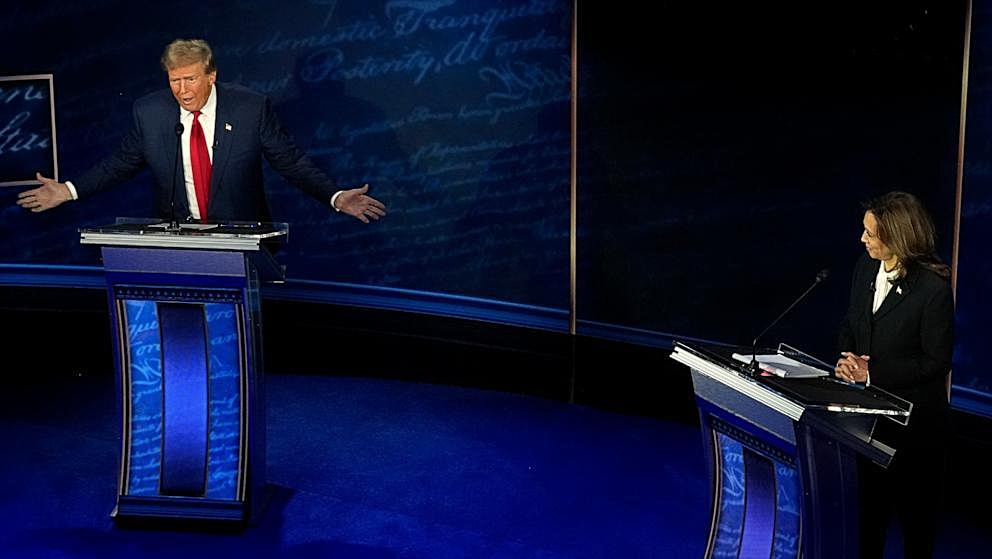On October 1st, the final debate of the 2024 presidential season will take place between Senator JD Vance (R-Ohio) and Minnesota Governor Tim Walz.
While the spotlight usually shines on the presidential candidates, vice presidential debates have had their fair share of memorable moments throughout history.
An example includes the first-ever televised vice presidential debate in 1976, which occurred sixteen years after the first televised presidential debate.
In the upcoming debate, much attention has been given to Ferraro’s limited political experience, having served only three terms or six years in the House of Representatives, rather than her gender.
During her debate, Ferraro confidently addressed the criticism by stating, “I wasn’t born at the age of 43, when I entered Congress. I did have a life before that.”
Although Ferraro acknowledged the historical significance of her candidacy, the focus of the debate primarily revolved around policy, qualifications, and experience, particularly in relation to foreign policy.

Throughout the debate, Ferraro emphasized her policy disagreements with Bush, specifically on civil rights, affirmative action, the growing influence of the religious right, and the Supreme Court.
Quayle, who was 41 years old at the time, struggled to dispel the perception of his youthfulness, leading to his ill-fated comparison of himself to Kennedy.
When questioned about being seen as too young for the vice presidency, Quayle argued that he had as much experience in Congress as John F. Kennedy when he ran for president.
In one of the most iconic moments in vice presidential debate history, Bentsen countered, “Senator, I served with Jack Kennedy, I knew Jack Kennedy. Jack Kennedy was a friend of mine. Senator, you’re no Jack Kennedy.”
To this day, this remark is frequently cited and studied as an exemplary instance of political rhetoric.
The debate also featured Senator Al Gore (D-Tenn.), Republican Vice President Dan Quayle, and independent candidate Adm. James Stockdale, who ran alongside billionaire and political outsider Ross Perot.

The Reform Party, although outside the political mainstream, achieved the most successful third-party bid in 80 years during the 1992 election.
Stockdale, the oldest of the three candidates, joked in his opening statement, “Who am I? Why am I here?”, acknowledging the curiosity surrounding the presence of a third-party candidate on the stage.
In the 2000 election, former Vice President George H.W. Bush faced mounting criticism from conservatives after he raised taxes, defying his infamous 1988 promise: “Read my lips, no new taxes.”
The fiscal conservatism that defined Perot’s agenda appealed to disillusioned Bush supporters.
The debate itself was chaotic, with Quayle and Gore continuously exchanging accusations and denials, often talking over each other. The moderator frequently intervened to allow Stockdale an opportunity to speak.
Addressing the turbulent atmosphere, Stockdale declared to a cheering audience, “I think America is seeing, right now, the reason this nation is in gridlock.”
Noisy interruptions aside, the debate primarily revolved around the U.S. invasion of Iraq following the September 11, 2001 terror attacks, a decision that deeply divided the American population.
Defending the Iraq War, Vice President Cheney, who actively influenced President George W. Bush’s foreign policy decisions, emphasized his extensive experience in this domain.
Cheney critiqued Edwards for being comparatively young and inexperienced, highlighting his frequent absences from votes and committee meetings by referring to him as “Senator Gone.”
Cheney remarked, “The first time I ever met you was when you walked on the stage tonight. I’m up in the Senate most Tuesdays when they’re in session.”

Edwards, on the other hand, capitalized on one of the most significant issues for Democrats in that election – their opposition to the direction of the Iraq War.
In 2008, Senator John McCain was viewed by some as too centrist to appeal to the Republican Party’s conservative, working-class base. Palin’s selection as his running mate was seen as an attempt to win back these voters.
As Palin and Biden took the stage, they shook hands, and microphones captured Palin asking Biden if she could address him as “Joe.” Biden granted her request.
Throughout the debate, Palin adopted a conversational tone, departing from the typical political rhetoric that dominated previous discussions.
The conversation revolved around critical issues such as climate change, energy policy, the economic impact of the 2008 financial crisis, and the divisive topic of same-sex marriage.
Despite potentially boosting Republican support among conservative voters, McCain and Palin ultimately fell short in the election, winning only 173 electoral votes compared to the Democrats’ 365.

